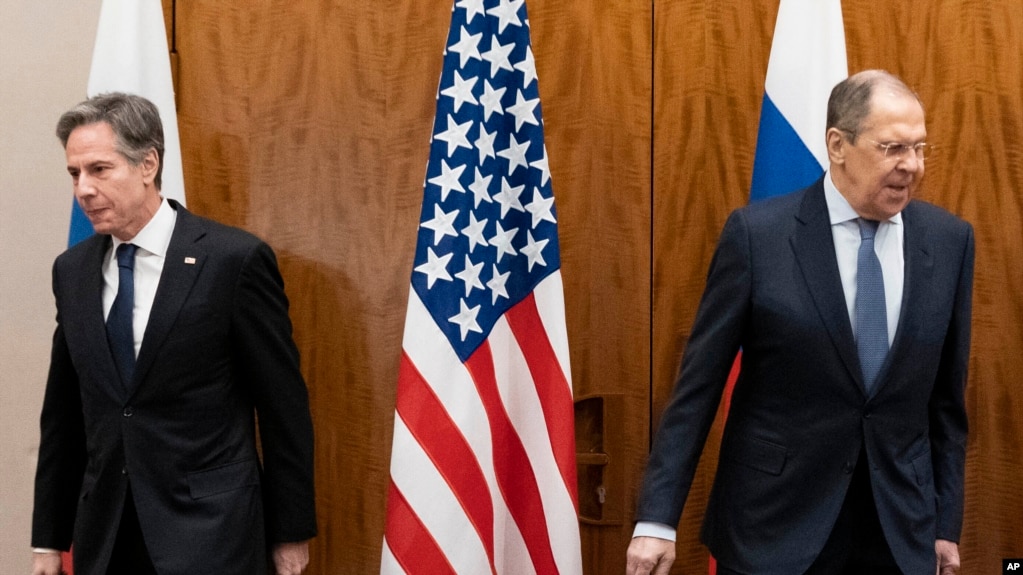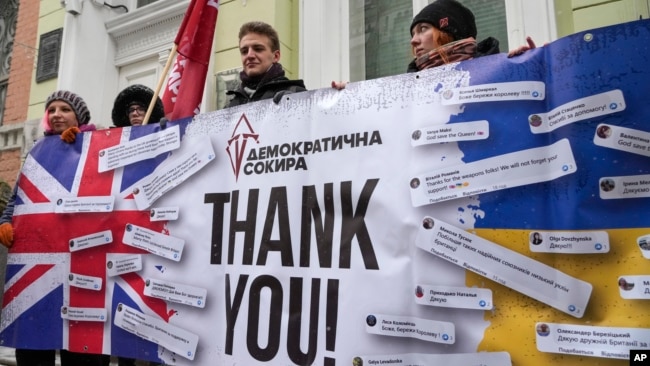Defending Ukraine's Territorial Integrity
"Putting things in writing is a good way to make sure we're as precise as possible, and the Russians understand our positions.""Right now, the document is with them, and the ball is in their court.""We made clear [in the diplomatic dispatch] that there are core principles that we are committed to uphold and defend, including Ukraine's sovereignty and territorial integrity and the right of states to choose their own security arrangements and alliances. There is no change. There will be no change."U.S. Secretary of State Antony Blinken
 |
| US Secretary of State Antony Blinken, left, and Russian Foreign Minister Sergey Lavrov move to their seats before their meeting, Jan. 21, 2022, in Geneva. |
It hardly seems possible that Russian President Vladimir Putin really thought he could demand that the United States and NATO accede to his no-compromise demand that would effectively give him control over how NATO must henceforth interpret its own rules and regulations. Mr. Putin is a realist, but has stated his ultimatum like a fabulist. It would be NATO's decision, not Russia's demands that would decide when and whether Ukraine would be welcomed into the alliance's fold.
"We call on Russia once again to immediately de-escalate the situation. NATO firmly believes that tensions and disagreements must be resolved through dialogue and diplomacy", responded Secretary-General Jens Stoltenberg from Brussels, in the wake of NATO having sent its own written response addressing Russia's security demands.
A resolve that was entirely predictable, and one which, acted on, has seen Russia and more specifically its president, Vladimir Putin, placed between a rock and a hard place, entirely of his own making. Still, the offer has been extended from NATO to Moscow in the recommendation to re-establish respective offices in Brussels and Moscow with the intention of resorting back to military channels of communication (and presumably compromise) in the pursuit of transparency and risk reduction.
Russia, of course, has its own perceptions of accommodation, meant to be extracted from NATO, not to be placed firmly in the place of the adversary required to relent on its threats to prevent an escalation of an already-tense situation in Europe. For what affects eastern Europe also has its effect on all of Europe, if for no other good reason than energy dependency in the west on the natural resources of the east.
"If the West continues its aggressive course, Moscow will take the necessary retaliatory measures", responded Russia's foreign minister, Sergey Lavrov. It was the U.S. ambassador to Moscow who handed the American written response to Alexander Grushko, the deputy foreign minister, leading Mr. Blinken to say "I have no doubt that Mr. Lavrov will share the letter with President Putin, and perhaps everybody else." No sooner done than said, to twist an old phrase.
German Chancellor Olaf Scholz inherited a sticky situation that his predecessor handled with a measure of tolerance for her Russian counterpart. To him now is left the details leading to an answer to the question whether Germans will freeze in their homes this winter, or be forced to cut back factory production should pressure from NATO and the U.S. prevail to the point of stopping the Nord Stream gas pipeline from Russia, bypassing Ukraine, into Germany.
While the United Kingdom has gone out of its way to assure Ukraine and give it material support, demanding its European allies "do more" to deter an anticipated Russian invasion, the German chancellor speaks of following a long-standing policy of refusing to supply arms to conflict zones. It would instead, send 5,000 helmets to Ukraine, in a reflection of Canada's offer to send more night-vision goggles and flak jackets when Ukraine is pleading for arms.
:format(jpeg)/cloudfront-us-east-1.images.arcpublishing.com/tgam/DTDPUQEGIZPGNM2YIDB3P7RSKA.JPG) |
A Russian army service member fires a howitzer during drills at the Kuzminsky range in the southern Rostov region, Russia, on Jan. 26. SERGEY PIVOVAROV/Reuters |
"Germany sells arms to Egypt, which is involved in conflicts with Yemen and Libya, but does not want to supply arms to Ukraine. That's hypocrisy", pointed out Lieut.-General Ben Hodges, formerly a U.S. army commander in Europe. "In sending 5,000 helmets to Ukraine, the government only worsens its own and Germany's position", stated the leader of the German opposition Christian Democrats. "It's embarrassing that the government believes the scope of this crisis could be expressed in helmets."
"We'll be legislating to toughen up our sanctions regime and make sure we are fully able to hit those individuals and companies and banks in Russia in the event of an incursion.""What's important is that all of our allies do the same, because it's by collective action by showing Vladimir Putin [that] we are united.""We would like to see our allies do more to help supply defensive support to Ukraine, and also put those sanctions in place."Elizabeth Truss, U.K. Foreign Secretary
 |
| Activists hold a poster to thank the British government for support during a rally at the British embassy in Kyiv, Ukraine, Friday, Jan. 21, 2022. The UK sent 30 elite troops and 2,000 anti-tank weapons to Ukraine amid fears of Russian invasion. |
Labels: Britain, Defense, Germany, NATO, Russia, Threats, Ukraine, United States
0 Comments:
Post a Comment
<< Home